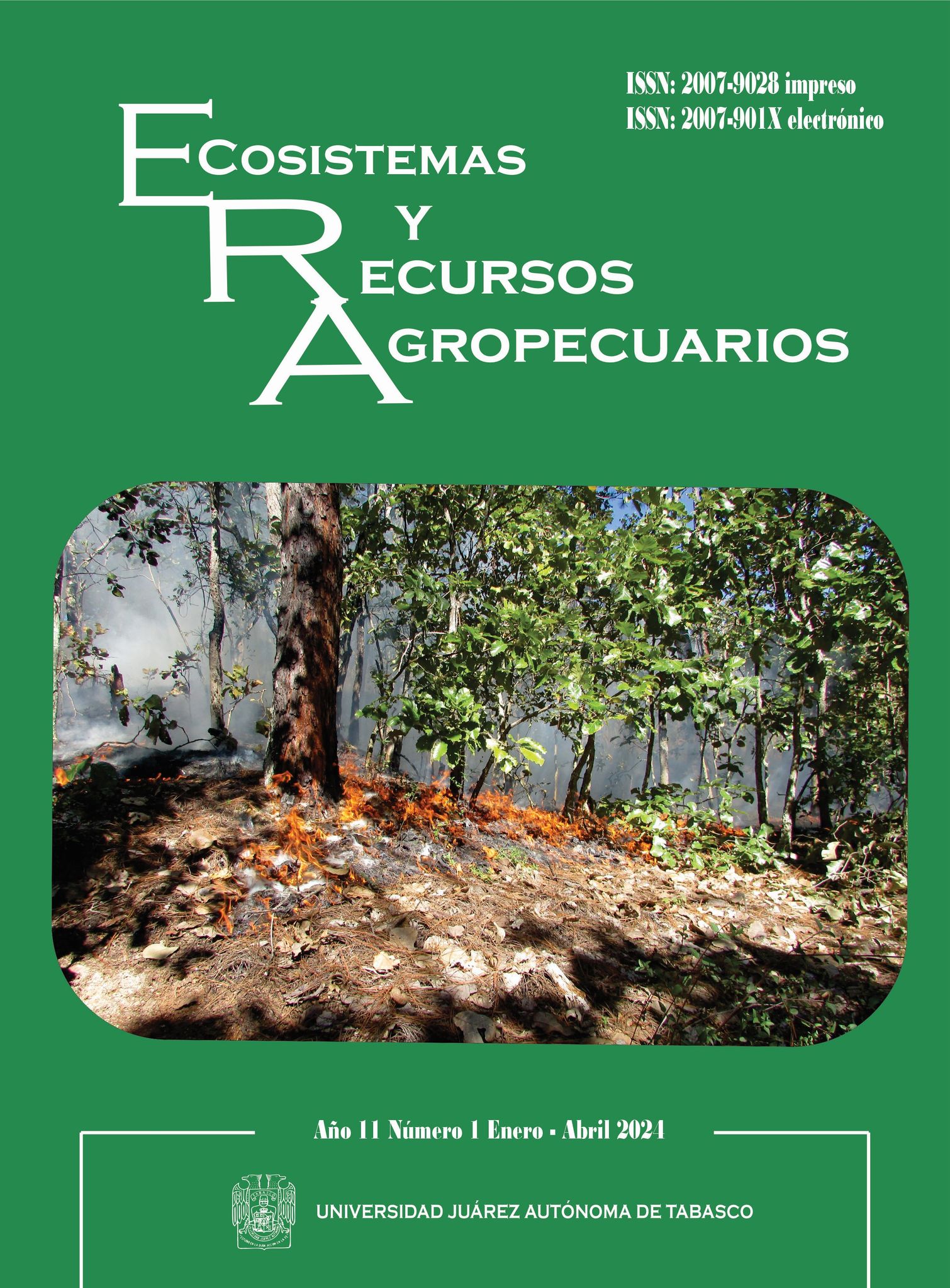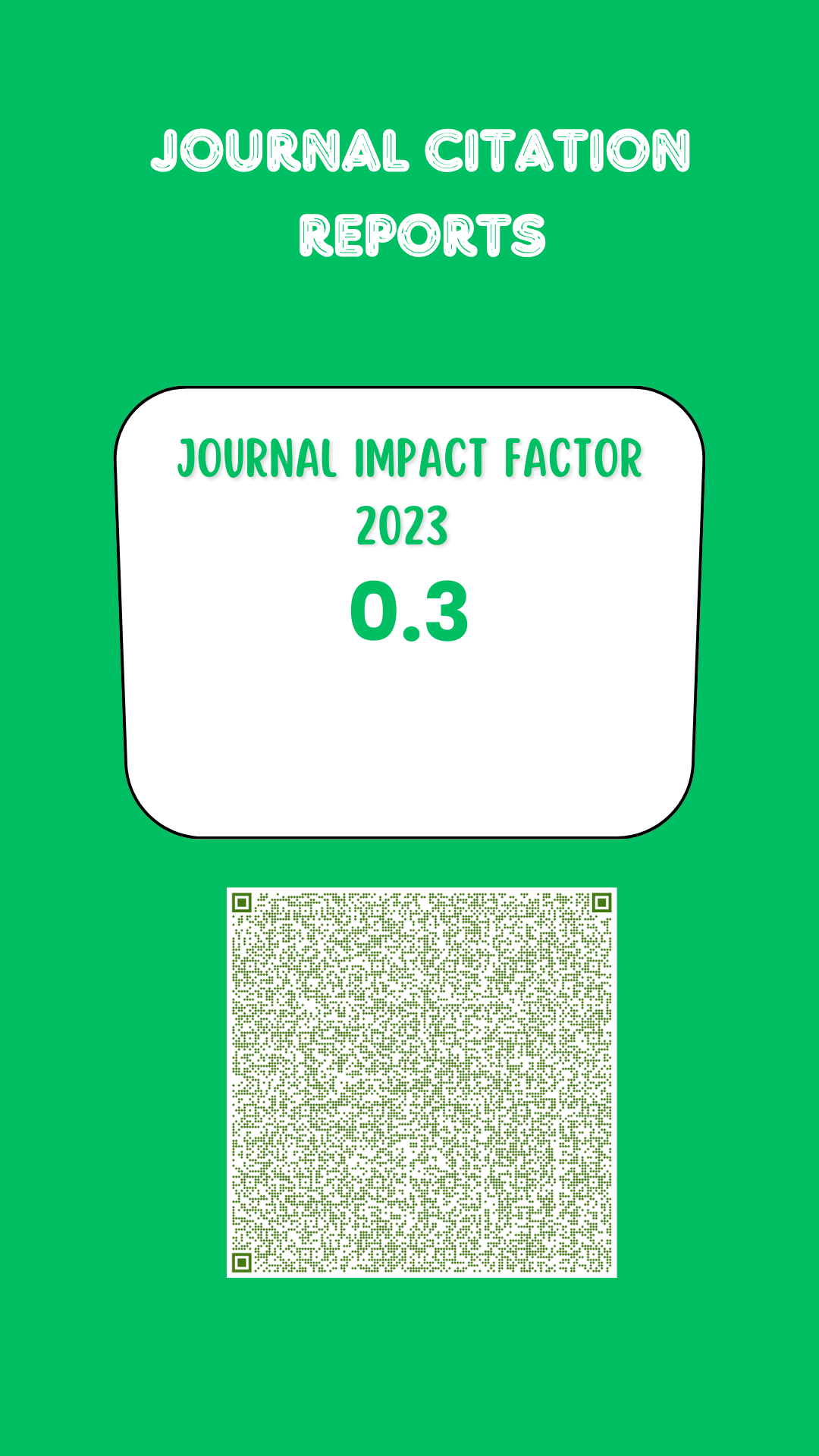Enzymatic defense and productivity of tilapia with chemical silage and bean sprout diets
DOI:
https://doi.org/10.19136/era.a11n1.3971Keywords:
Oreochromis noloticus, growth, SOD, CAT, black bean sproutsAbstract
After 60 days of experimentation, the effect of three diets based on chemical silage (CHS) and black bean sprouts (BS) was evaluated (DC = control diet; D1 = CHS; D2 = BS; D3 = CHS+BS) on enzymatic defense (activity of superoxide dismutase, SOD, and catalase, CAT) in the liver of tilapia, and production parameters (weight gain, protein efficiency rate, survival, feed conversion factor), prior chemical characterization of CHS, BS and the experimental diets (proximate chemical analysis, amino acids, fatty acids, anti-nutritional substances, total phenols (TPH), total flavonoids (TFl) and antioxidant capacity (AC). A randomized block design was applied with three replications using 120 masculinized GIFT tilapia juveniles of average weight of 9.6 ± 0.12 g. TPH, TFlv, and AC were analyzed by Pearson, and correlation coefficient, enzymatic activity, and productive parameters were evaluated with a one-way ANOVA and a Tukey post-hoc test (95%). Survival was 100% in all treatments and there were significant differences (p<0.05) in the effect on diets. The best diet in growth and production parameters in the fish was D3, suggesting a synergy between the components of CHS and BS. This last component was a source of antioxidants that improved SOD and CAT activities, promising health promotion. D3 represents an alternative food for the growth and health promotion of tilapia, prior challenge testing and evaluation with adverse factors, and verifying its efficiency in the following growth stages under real conditions.
Downloads
References
Aguilera Morales ME, Canales Martínez MM, Ávila González E, Flores Ortíz CM (2018) Nutrients and bioactive compounds of the Lemna gibba and Ulva lactuca as possible ingredients to functional foods. Latin American Journal of Aquatic Research 46 (4): 709-716. http://dx.doi.org/10.3856/vol46-issue4-fulltext-8
Aisha A, Raja AS, Farooq AS, Shaukat AS, Khalid MA (2015) Chemical composition and biological activities of leaves of Zizyphus maurititiana L native to Pakistan. Journal Botany 47 (1): 367-376. https://www.pakbs.org/pjbot/PDFs/47(1)/51.pdf Fecha de consulta: 12 Julio de 2023.
Akkad R, Buchko A, Johnston S, Han J, House J, Curtis J (2021) Sprouting improves the flavour quality of faba bean flours. Food Chemistry 364: 130355. https://doi.org/10.1016/j.foodchem.2021.130355
AOAC (2016) Official Methods of Analysis of AOAC International. (20Ed.). Gaithersburg, E.U.U. 3172 p.
Armenta-López GE, Sumaya-Martínez MT, Spanopoulos-Hernández M, Balois-Morales R, Sánchez-Herrera M, Jiménez-Ruíz E (2015) Inclusion of natural antioxidant compounds in fish feeds to counteract oxidative stress. Revista Bio Ciencias 3(2): 68-78. http://dx.doi.org/10.15741/revbio.03.02.01
Cardador MA, Martínez TY, Gallardo VT, Sánchez CXM, Martínez HJ, Corzo RLJ, Jiménez MC (2020) Effect of instant controlled pressure-drop on the non-nutritional compounds of seeds and sprouts of common black bean (Phaseolus vulgaris L.). Molecules 25(6): 1464. http://dx.doi.org/10.3390/molecules25061464 PMid: 32213962.
Coy BCA, Parra J, Cuca SLE (2014) Caracterización química del aceite esencial e identificación preliminar de metabolitos secundarios en hojas de la especie Raputia heptaphylla (rutaceae). Revista Elementos 4: 1-9. https://doi.org/10.15765/e.v4i4.513
Da-Rocha SNJ, Silva RF, Gonçalves AA, Coelho EMG (2019) Tilapia processing waste silage (TPWS): An alternative ingredient for Litopenaeus vannamei (Boone 1931) diets in biofloc and clear water system. Aquaculture and Fisheries 4(5): 214-218. https://doi.org/10.1016/j.aaf.2019.04.005
Del-Pino VH, Lajolo FM (2003) Inhibitory effect of carioca bean tannins on phaseolin digestibility assessed by two multi-enzymatic systems. Food Science Technology 23 (1): 49-53. https://doi.org/10.1590/S0101-20612003000100011
Díaz-Sánchez MF, Martín-Cabrejas MA, Martínez-Pérez M, Savón-Valdés LL, Aguilera Y, Benítez V, Torres-Cárdenas V, Coto-Valdés G, González-Conde A, Sarmiento-Menéndez M, Hernández-Herrera Y (2017) Germinados de leguminosas temporales: Una alternativa para la alimentación animal. Cuban Journal of Agricultural Science 51(3): 381-390.
Elabd H, Wang HP, Shaheen A, Yao H, Abbass A (2017) Anti-oxidative effects of some dietary supplements on yellow perch (Perca flavescens) exposed to different physical stressors. Acuaculture Reports 8: 21–30. https://doi.org/10.1016/j.aqrep.2017.09.002
El-Sayed FM (2019) Tilapia culture. 2a edition. ESELVIERE. https://shop.elsevier.com/books/tilapia-culture/el-sayed/978-0-12-816541-6. https://doi.org/10.1016/j.foodchem.2016.07.046
Evangelho JA, Levien VN, Zanella PV, De Berríos JJ, Guerra DAR, DaRosa ZE (2017) Black bean (Phaseolus vulgaris L.) protein hydrolysates: physicochemical and functional properties. Food Chemistry 214 (1): 460-467
FAO (2022) The state of world fisheries and aquaculture. Food and Agriculture Organization of the United Nations. Contributing to food security and nutrition for all. Rome. 237p.
Gaviria YS, Figueroa OA, Zapata JE (2021) Efecto de la inclusión de ensilado químico de vísceras de tilapia roja (Oreochromis spp.) en dietas para pollos de engorde sobre los parámetros productivos y sanguíneos. Información Tecnológica 32(3): 79-88. https://dx.doi.org/10.4067/S0718-07642021000300079
Ghiassi Tarzi B, Gharachorloo M, Baharinia M, Mortazavi SA (2012) The effect of germination on phenolic content and antioxidant activity of chickpea. Iranian Jornal of Pharmaceutical Research 11(4): 1137–1143.
Gidenne T, Mirabito L, Jehl N, Pérez JM, Arveux P, Bourdillon A, Briens C, Duperray J, Corrent E (2004) Impact of replacing starch by digestible fiber, at two levels of lignocelluloses, on digestion, growth and digestive health of the rabbit. Animal Science 78: 389-398.
González Salas R, Romero Cruz O, Valdivié Navarro M, Ponce-Palafox JT (2014) Los productos y subproductos vegetales, animales y agroindustriales: Una alternativa para la alimentación de la tilapia. Revista Bio Ciencias 2(4): 240-251. https://doi.org/10.15741/revbio.02.04.02
Guajardo FD, Serna SSO, Gutiérrez UJA (2013) Evaluation of the antioxidant and antiproliferative activities of extracted saponins and flavonols from germinated black beans (Phaseolus vulgaris L.). Food Chemistry 141(2): 1497-1503 https://doi.org/10.1016/j.foodchem.2013.04.010
Haug W, Lantzsch HJJ (1983) Sensitive method for the rapid determination of phytate in cereals and cereal products. Journal of the Science of Food and Agriculture 34: 1423. https://doi.org/10.1002/jsfa.2740341217
Hidalgo MC, Morales AE, Arizcun M, Abellán E, Cardenete G (2017) Regional asymmetry of metabolic and antioxidant profile in the sciaenid fish shi drum (Umbrina cirrosa) white muscle response to starvation and refeeding redox. Biology 11: 682–687. https://doi.org/10.1016/j.redox.2017.01.022
Islam MJ, Peñarubia OR (2021) Seafood waste management status in Bangladesh and potential for silage production. Sustainability 13: 2372. https://doi.org/10.3390/su13042372
Ibrahima RE, El-Houseinya W, Behairyb A, Abo-Elmaatyc A, Al-Sagheerd AA (2019) The palliative role of Eruca sativa leaves dietary supplementation against oxidative stress, immunosuppression, and growth retardation in temperature-stressed Oreochromis niloticus. Journal of Thermal Biology 84: 26-35. https://doi.org/10.1016/j.jtherbio.2019.05.026
Imtiaz H, Burhan U (2012) Optimization effect of germination on functional properties of wheat flour by response surface methodology. International Research Journal of Plant Science 3(3): 031-037.
Jiménez-Ruíz EI, Rodríguez-Carpena JG, Hernández-Ortega GP, Sumaya-Martínez MT, Balois-Morales R, Sánchez-Herrera LM, Peraza-Gómez V (2019) Antioxidant properties of a tilapia (Oreochromis niloticus) diet with the inclusion of avocado by-product. Revista Biotecnia 21(3): 163-169. https://doi.org/10.18633/biotecnia.v21i3.1053
Khalil F, Mehrim A, Refaey M (2015) Impact of dietary rocket (Eruca sativa) leaves or seeds on growth performance, feed utilization, biochemical and physiological responses of Oreochromis niloticus fingerlings. Asian Journal of Animal Science 9: 134-147. http://dx.doi.org/10.3923/ajas.2015.134.147
Lastra VH, Rodríguez LE, Ponce de León RH, González Sanabia ML (2000) Método analítico para la cuantificación de taninos en el extracto acuoso de romerillo. Revista Cubana de Plantas Medicinales 5(1): 17-22.
Lizárraga VCE, Hernández C, González AGA, Basilio HJ (2018) Propiedades antioxidantes e inmunoestimulantes de polifenoles en peces carnívoros de cultivo. CienciaUAT 12(2): 127-136
Le TN, Chiu CH, Hsieh PC (2020) Bioactive compounds and bioactivities of Brassica oleracea L. var. italica sprouts and microgreens: An updated overview from a nutraceutical perspective. Plants 9: 1-23. https://doi.org/10.3390/plants9080946
Lopera BN, Poveda P (2009) Exigencias nutricionales en peces tropicales: factores y métodos de estimación. Revista Colombiana de Ciencia Animal 2(2): 54-66.
Lozano M, Tícona E, Carrasco C, Flores Y, Almanza GR (2012) Cuantificación de saponinas en residuos de quinua real Chenopodium quinoa willd. Revista Boliviana de Química 29(2): 131-138.
Mendoza MGD, Hernández GPA, Plata PFX, Martínez GJA, Arcos GJL, Lee RHA (2022) Nutrición animal cuantitativa. Editorial CBS. Universidad Autónoma Metropolitana. México. 622p.
Mendoza SM, Pérez RIF, Wall MA, Martinez GAI, Gallegos CMA, Reynoso CR (2019) Chemically induced common bean (Phaseolus vulgaris L.) sprouts ameliorate dyslipidemia by lipid intestinal absorption inhibition. Journal of Functional Foods 52: 54-62 https://doi.org/10.1016/j.jff.2018.10.032
NRC (2011) Nutrient requirements of warm water fishes and shellfishes. Washington DC: National Academy Press. 392 p. https://doi.org/10.17226/13039
Ocheme O, Adedeji O, Lawal G, Zakari U (2015) Effect of germination on functional properties and degree of starch. Journal of Food Research 4(2): 159-165. https:doi.org/10.5539/jfr.v4n2p159
Olsen RL, Toppe J (2017) Fish silage hydrolysates: no only a feed nutrient, but also a useful feed additive. Trends in Food Science & Technology 66: 93-97 https://doi.org/10.1016/j.tifs.2017.06.003
OMSA (2021) Código Sanitario para los Animales Acuáticos. Organización mundial de sanidad animal. 23a ed. WOAH-OIE. 316p.
Perea-Román C, Hoyos-Concha JL, Garcés-Caicedo YJ, Muñoz-Arboleda LS, Gómez-Peñaranda JA (2017) Evaluación de procesos para obtener ensilaje de residuos piscícolas para alimentación animal. Ciencia en Desarrollo 8(2): 47-58. https://doi.org/10.19053/01217488.v8.n2.2017.6174
Ramírez RSC, Ortega OH, Fortis HM, Nava SJM, Orozco VJA, Preciado RP (2021) Nanopartículas de quitosano mejoran la calidad nutracéutica de germinados de triticale. Revista Mexicana de Ciencias Agrícolas 12(4): 579-589. https://doi.org/10.29312/remexca.v12i4.2929
Ríos MV, Guzmán-Guillén R, Prieto AI, Moreno IM, Cameán AM (2013) Alteración de biomarcadores de estrés oxidativo en Tilapia (Oreochromis niloticus) expuesta a dosis repetidas de cilindrospermopsina por diferentes vías de exposición. Revista Toxicológica 30: 149-160.
Sahin K, Orhan CM, Tuzcu Ali S, Sahin N, Hayirli A (2010) Epigallocatechin-3-gallate prevents lipid peroxidation and enhances antioxidant defense system via modulating hepatic nuclear transcription factors in heat-stressed quails. Poultry Science 89(10): 2251-2258. https://doi.org/10.3382/ps.2010-00749
Sangronis E, Rodríguez M, Cava R, Torres A (2006) Protein quality of germinated Phaseolus vulgaris. Eureopean Food Research and Technology 222: 144-148. http://dx.doi.org/10.1007/s00217-005-0137-4
Shi Q, Xiong X, Wen Z, Qin C, Li R, Zhang Z, Gong Q, Wu X (2022) Cu/Zn superoxide dismutase and catalase of Yangtze Sturgeon, Acipenser dabryanus: Molecular cloning, tissue distribution and response to fasting and refeeding. Fishes 7(35): 1-16. https://doi.org/10.3390/fishes7010035
Spanopoulos HM, Ponce PJT, Quintero BG, Ruelas IJ, Tiznado CM, Hernández GC, Shirai K (2010) Production of biological silage from fish waste, the smoked yellowfin tuna (Thunnus albacares) and fillet of tilapia (Oreochromis sp) for feeding aquaculture species. Revista Mexicana de Ingeniería Química (9): 167-178.
Torres NMD, Hurtado NL (2012) Requerimientos nutricionales para tilapia del Nilo (Oreochromis niloticus). ORINOQUIA 16(1): 63-68. https://doi.org/10.22579/20112629.266
Watters CA, Rosner LS, Franke AA, Dominy WG, Klinger-Bowen R, Tamaru CS (2013) Nutritional enhancement of long-chain omega-3 fatty acids in Tilapia (Oreochromis honorum). Israeli Journal of Aquaculture Bamidgeh 65: 1–7.
Xue Z, Wang C, Zhai L, Yu W, Chang H, Kou X, Zhou F (2016) Bioactive compounds and antioxidant activity of mung bean (Vigna radiata L.), soybean (Glycine max L.) and black bean (Phaseolus vulgaris L.) during the germination process. Czech Journal of Food Science 34: 68–78. http://doi.org/10.17221/434/2015-CJFS
Downloads
Published
Issue
Section
License
Copyright (c) 2024 Ecosistemas y Recursos Agropecuarios

This work is licensed under a Creative Commons Attribution-NonCommercial-ShareAlike 4.0 International License.
Aviso de copyright
Los autores que se envían a esta revista aceptan los siguientes términos:
una. Los autores conservan los derechos de autor y garantizan a la revista el derecho a ser la primera publicación del trabajo con una licencia de atribución de Creative Commons que permite a otros compartir el trabajo con un reconocimiento de la autoría del trabajo y la publicación inicial en esta revista.
B. Los autores pueden establecer acuerdos complementarios separados para la distribución no exclusiva de la versión del trabajo publicado en la revista (por ejemplo, en un repositorio institucional o publicarlo en un libro), con un reconocimiento de su publicación inicial en esta revista.
C. Se permite y se anima a los autores a difundir su trabajo electrónicamente (por ejemplo, en repositorios institucionales o en su propio sitio web) antes y durante el proceso de envío, ya que puede conducir a intercambios productivos, así como a una cita más temprana y más extensa del trabajo publicado. (Consulte El efecto del acceso abierto).



